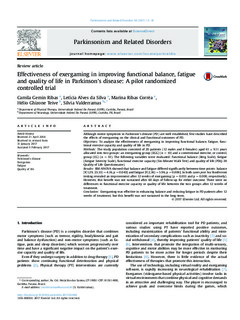Effectiveness of exergaming in improving functional balance, fatigue and quality of life in Parkinson's disease: A pilot randomized controlled trial
Ribas, Camila Gemin; da Silva, Letícia Alves; Corrêa, Marina Ribas; Teive, Hélio Ghizone; Valderramas, Silvia
Journal article

Åpne
Permanent lenke
http://hdl.handle.net/11250/2588797Utgivelsesdato
2017Metadata
Vis full innførselOriginalversjon
Camila Gemin Ribas, Letícia Alves da Silva, Marina Ribas Corrêa, Hélio Ghizone Teive, Silvia Valderramas. Effectiveness of exergaming in improving functional balance, fatigue and quality of life in Parkinson's disease: A pilot randomized controlled trial. Parkinsonism & Related Disorders, Volume 38, 2017, Pages 13-18. ISSN 1353-8020. https://doi.org/10.1016/j.parkreldis.2017.02.006Sammendrag
Although motor symptoms in Parkinson's disease (PD) are well established, few studies have described the effects of exergaming on the clinical and functional outcomes of PD.
Objectives
To analyze the effectiveness of exergaming in improving functional balance, fatigue, functional exercise capacity and quality of life in PD.
Methods
The study population consisted of 20 patients (12 males and 8 females) aged 61 ± 9.11 years allocated into two groups: an exergaming group (EGG) (n = 10) and a conventional exercise, or control, group (CG) (n = 10). The following variables were evaluated: functional balance (Berg Scale), fatigue (Fatigue Severity Scale), functional exercise capacity (Six-Minute Walk Test) and quality of life (PDQ-39 Quality of Life Questionnaire).
Results
RM-ANOVA showed that balance and fatigue differed significantly between time points: balance [F(1.29, 23.33) = 4.16, p = 0.043] and fatigue [F(2,36) = 5.96, p = 0.006]. In both cases post hoc Bonferroni testing revealed an improvement after 12 weeks of exergaming (p = 0.033 and p = 0.000, respectively). However, this benefit was not sustained after 60 days of follow-up for either outcome. There were no differences in functional exercise capacity or quality of life between the two groups after 12 weeks of treatment.
Conclusion
Exergaming was effective in enhancing balance and reducing fatigue in PD patients after 12 weeks of treatment, but this benefit was not sustained in the long-term.